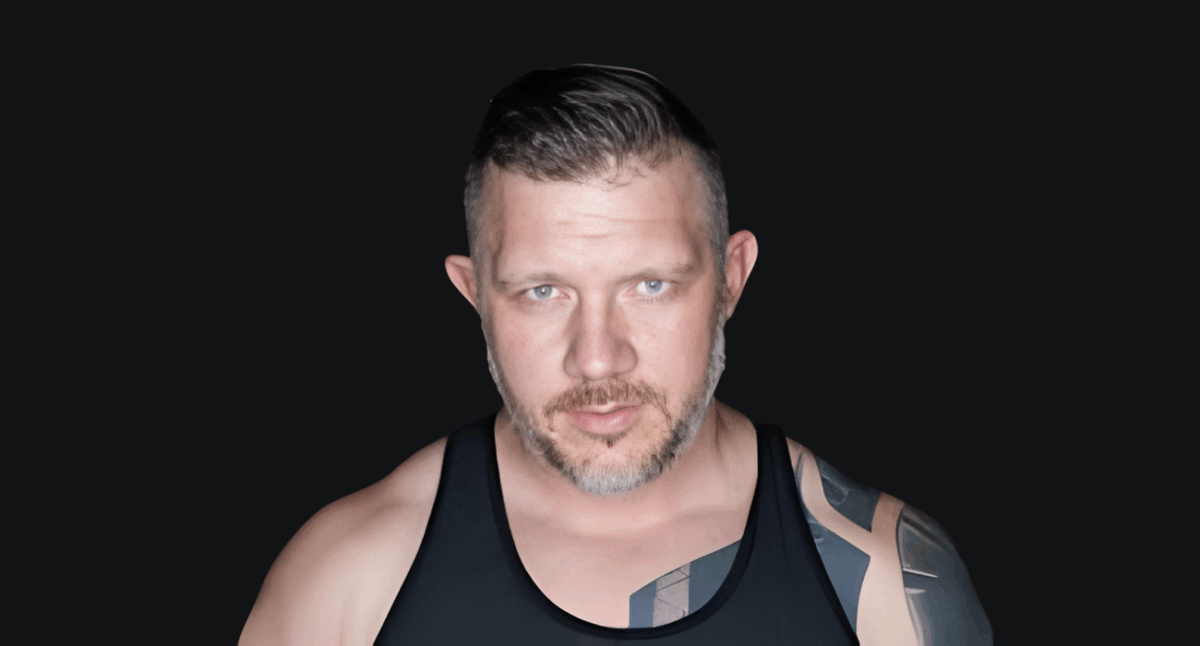When Tim Rexius talks about hunger, he doesn’t mean a mood or a mindset.
At 19, he was sleeping in a 1983 Oldsmobile, choosing between paying rent and betting on himself. He picked the business. The business failed. And for about six months, he lived in his car, sneaking into McDonald’s to steal ketchup packets, mixing them with hot water to make what he now darkly jokes was “tomato soup.”
That kind of hunger imprints on you. In Tim’s case, it became the throughline of everything that came after: a short-lived NFL shot, a science-heavy career in pandemics, a hard pivot out of Washington, D.C. politics, and ultimately a bootstrapped empire of gyms, nutrition stores, and a protein popcorn brand now in roughly 30,000 retailers across 16 countries.
“I remember what it’s like to be literally hungry,” he shares. “That changes how you show up. All I had was me. I had to figure it out.”
Today, he runs four companies, parents six kids, is a new grandfather, and still insists on being the first one in the building on Mondays.
This is how he got there—with no investors, no trust fund, and no safety net.
When Hunger Becomes Your First Investor
Tim grew up in a house with a simple rule: when you’re out, you’re out.
At 19, he had a fork-in-the-road decision: use his limited money to pay rent or start a business. He launched a lawn-mowing service while in college, believing hustle alone would cover the gap.
It didn’t.
He mowed some lawns, but not enough to survive, and ended up living in his car for about six months. The low point? Walking into McDonald’s, pocketing ketchup packets, and heating them with water so he could at least drink something warm and flavored.
For almost three decades, that memory has stayed live in his nervous system.
“I don’t mean hungry like a metaphor,” he says. “I mean literally hungry. That will drive your sales ability. You realize nobody is coming to save you.”
It’s also what makes his later decisions—walking away from comfortable salaries, doubling down on unproven ideas, cutting employees into ownership—make a lot more sense. Once you’ve built from zero, you don’t romanticize safety the way other people do.
From NFL Bloopers To Pandemic Specialist
Tim eventually dug his way out of his car, finished college, and landed what many would consider the dream: a shot at the NFL.
It didn’t last long. Eight weeks into his pro career, he got injured “touching nobody” and ended up on an ESPN blooper reel—a perfect metaphor for plans that look promising on paper and fall apart instantly.
From there, he moved into the nutrition retail space he loved, but with no idea how to access capital and no wealthy family safety net, he did what a lot of undercapitalized entrepreneurs end up doing: he took a job that paid well, even if it wasn’t aligned.
That job turned out to be in industrial chemicals, specializing in pandemic outbreaks like West Nile, avian flu, and swine flu. He went back to school, got a master’s in biomechanical engineering, and spent years as the “science nerd” in the room.
The work eventually took him to Washington, D.C., where he spent about six years working around politicians.
For plenty of people, that would be the success story. For Tim, it was the early onset of a slow, spiritual burn-out.
“I know some people might like it,” he admits, “but I despised it. There wasn’t enough money to make me okay with what it did to my soul.”
Burning The “Good Job” To Start Over In Omaha
At 29, with a couple of kids and a respectable career, Tim did something most people only fantasize about: he walked away.
“I was just young enough and dumb enough to go for broke,” he says.
He left D.C. and went back to what he loved—helping people transform their health—and opened his first nutrition store, Rexius Nutrition, in Omaha, Nebraska.
The timing wasn’t romantic. He went through a divorce in the middle of building. Growth wasn’t overnight. But he kept going.
To this day, his framing of the work is telling. He doesn’t talk about “supplements” or “retail” as much as he talks about the emotional context of his customers:
- People rebuilding after divorce
- People crawling out of depression
- People drowning in financial stress
- People navigating grief
“Look good, feel good is an expression for a reason,” he says. “It’s not just vanity. There’s real power in helping someone change how they look and feel. I consider that honorable.”
It’s why, even now, with multiple companies, he prides himself on being the first one in the building on Mondays. That early hunger never fully leaves.
The Gym That Banned Him—And The Empire It Accidentally Built
By 2017, his wife Brittany had gotten into amateur bodybuilding. Tim followed suit. At 37, he beat a crowd of twentysomethings to win the LA Open.
The week before that victory, something else happened: he and an employee (now business partner) were kicked out of their gym in Omaha.
The reason? The gym wanted to sell supplements. Tim already did.
They banned him.
The average reaction would have been outrage, maybe a rant, maybe a lawsuit. Tim’s was different: if he couldn’t be in their gym, he’d build his own.
That idea became Iron Heaven Gyms. What started as a planned hole-in-the-wall soon turned into a 33,000-square-foot flagship—and a whole new model of what a gym could be.
Instead of just machines and mirrors, Iron Heaven evolved into a “look good, feel good” ecosystem:
- Gym and training
- On-site barbershop
- Tanning
- Hormone therapy clinic
- Massage therapy
- Saunas and red light therapy
If it supported transformation, they layered it in.
At the same time, Tim was quietly working on the product that would eventually explode far beyond Nebraska.
Cracking The Code On Protein Popcorn (And Bleeding For It)
The catalyst was deceptively simple: his kids and his elderly parents weren’t eating enough protein.
“Try getting protein into kids and 70-something parents that doesn’t look like chicken nuggets or chocolate milk,” he laughs. “My youngest is like negotiating with a terrorist.”
He asked a basic but powerful question: What’s the one thing both generations eat without complaint? The answer: flavored popcorn—caramel, cheddar, all the “fun” versions.
Most protein snacks in the U.S. use the cheapest possible protein because it pads margins. As a serious athlete and a science nerd, he refused to build something he wouldn’t eat himself.
So in 2017 and 2018, he went to war in the lab.
- ~600 batches, most of them terrible.
- One disastrous batch where his wife forgot to remove the seeds and someone cracked a tooth.
- He jokes: “I bled for this company.”
Eventually, they hit the eureka moment: a caramel corn that tasted indulgent but used high-grade, flavorless protein and athlete-level macros.
He also knew better than to market it as “healthy” up front. “You tell people it’s healthy, they think it’s gonna look green and smell like socks,” he says. So he went stealth.
At family Christmas, he put bowls of the popcorn out without saying a word. His brothers (both doctors) and his mom (a career RN) demolished it. Only then did he drop the truth: it was engineered to be high-protein.
That validation turned into a first product launch: Optimal Performance Popcorn, with candy-coated flavors aimed at post-workout and cheddar flavors aimed at pre-workout.
The market, however, didn’t care about his intention.
“For five years, it was a disaster,” he admits. “Everyone who tried it liked it. I just couldn’t get over the hump.”
The breakthrough would come from a place he didn’t expect: a grocery chain, a consignment deal, and a demographic he’d never explicitly targeted—kids and old ladies.
The Hy-Vee Experiment: Kids, Grandmas, And A Reality Check
When Tim was “voluntold” into becoming Chamber of Commerce president, a local Hy-Vee grocery store asked if they could carry his popcorn.
He didn’t think it would move. His wife was already questioning the spend. So he structured it as consignment—if it didn’t sell, he wouldn’t owe buyback money.
What happened next shocked him.
In one month, the grocery store outsold his own retail locations 50:1.
He sent his daughters to “spy” at the store and report on who was buying. The answer came back clear: young kids and elderly women.
When he spoke to the in-house dietitian, she told him it had become her only reliable snack recommendation that both groups would actually eat and rebuy. Some older women were buying six to eight bags at a time.
Hy-Vee expanded him to 10 stores. The performance replicated. Eventually, corporate moved to roll out much wider.
He was on his way—but the real acceleration came after a humbling experience at the Sweets & Snacks Expo in Chicago.
From Empty Booth To 400-Person Line: The Power Of Saying What It Is
On Hy-Vee’s recommendation, Tim invested heavily to exhibit at the Sweets & Snacks convention at McCormick Place in Chicago:
- 200,000+ qualified buyers
- 1,200+ vendors
- A literal 60-foot chocolate fountain at Hershey’s booth
He spent big on branding and staff. Day one: not a single person stopped at his booth.
“I wanted to go straight to the bar,” he says.
His wife, again, cut straight to the blind spot. “Do you think the fact that our label doesn’t say ‘healthy’ or ‘protein’ anywhere might be confusing?”
He’d been designing for his own ecosystem—gyms and nutrition stores—where everything is assumed to be healthy. On a regular grocery floor, shoppers had no idea what made his product different.
So at 10 p.m. in Chicago, they went to Staples, paid $200 for a rush banner that simply read “PROTEIN POPCORN.” They safety-pinned it to their expensive backdrop.
Day two and three?
They had a line of 300–400 people for two straight days.
A representative from Hershey’s even walked over to offer brutally candid feedback: the bag was ugly, the name didn’t make sense, there was no mascot, no clear branding, and the only good thing about the product was the taste.
Most founders would get defensive. Tim took notes.
On the flight home, his wife pointed out something else: he hadn’t been grocery shopping in 10 years. When they’d let him go once, he’d bought the cheapest bulk items he could find—dad brain, not brand brain.
So he did something a lot of founders struggle with: he got out of the way.
He let his wife and daughters redesign the packaging, rename the brand, and rebuild the front end.
That’s how Omaha Protein Popcorn and its flexing popcorn mascot were born—designed to be, as his daughter put it, “aesthetically pleasing.”
The numbers since then tell the rest of the story:
- Over 16,000% growth in the last 24 months
- Now in roughly 30,000 global retailers
- Presence in 16 countries and counting
- Projected 300% additional growth in the next six months
His in-house R&D department is simple: six kids spread across 20 years. “If I can get all six to agree on a flavor,” he says, “I know I have a home run.”
Scaling Through Owners, Not Employees
A lot of founders talk about “team as family.” Tim has operationalized it in a way that directly affects his ability to scale.
He doesn’t see employees as fixed roles. He sees them as long-term interviews for partnership.
- Many of his business partners and franchisees started as employees.
- His partner in the gyms, Nick, went from staff to owner after Tim told him plainly he couldn’t have both a safe paycheck and true partnership.
- His GM and Director of Logistics for the popcorn company used to be his kids’ chemistry teacher, working part-time in summers before Tim invited him to leap. Today, he’s a shareholder.
“I look at employing people as long-term job interviews for a future business partner,” Tim says. “If I find somebody with talent and I’m pouring into them, why would I just let them walk away? You make them an owner.”
Practically, that has meant:
- Allowing people to buy in via promissory notes
- Selling locations to high-potential staff
- Cutting key players into equity even when they don’t have cash up front
It has also meant making choices his board finds baffling—at least at first.
“My board has probably wanted to have me committed more than once,” he laughs. “But it’s worked so many times they mostly just let me do what I want.”
The payoff is loyalty. Owners care differently than employees ever will. When people know there’s a real path to partnership, they show up at a different level.
Passion Before Paycheck (But Not Instead Of It)
When he was making good money in Washington, D.C., Tim found himself spending heavily on everything outside of work just to feel alive. The work itself didn’t do it.
“I still ended up broke,” he says.
Now, it’s flipped. The work itself—building, mentoring, creating products that genuinely help—is what fills the tank. The money is real, but it isn’t the core reason to wake up.
“When your passion is your paycheck, material things stop being the driver,” he says. “You can absolutely make your passion your paycheck—you just have to make sure the passion comes first.”
That philosophy bleeds into how he thinks about legacy.
It’s not just about what his kids or grandkids will be told about him. He asks a more confronting question: What will his employees’ grandkids be told about him? Did he change the trajectory of their family story?
“If you really want the hair on the back of your neck to stand up,” he says, “ask yourself that. Have you impacted people to that level?”
Calendars, Faith, And The Myth Of Balance
On paper, Tim’s life looks like chaos: four companies, global travel, speaking, six kids ranging from grade school to adulthood, and now a grandson.
The solution has been radical intentionality.
“We have seven calendars,” he says flatly. “If it’s not on the calendar, it doesn’t happen.”
Every quarter, the family and the business have joint meetings. He walks everyone through the next round of travel—Las Vegas, Grand Cayman, Montreal, Mexico—so no one is left guessing where dad is or why.
He doesn’t just calendar deals and flights. He calendars presence:
- His daughter’s show choir performance goes on the calendar, along with his role as “show choir dad.”
- Workouts in his own gyms are scheduled like meetings—otherwise he’ll sacrifice his health for the business.
- Even creative outlets like guitar and hobbies like golf get specific time slots: 20 minutes here, 30 minutes there.
On family vacations, he’s up at 4:00 a.m., working quietly for a couple of hours before anyone wakes up. By the time his kids are up, the laptop is away. They feel him fully there.
He’s also unapologetically anchored in faith.
Every morning, on the drive between office and warehouse, he listens to devotionals and the Bible app. When emotions or stress spike, that’s his re-center point.
“You can get really angry and emotional,” he says. “But that practice resets me back where I’m supposed to be.”
The Global View: Popcorn In Dubai And A Bigger Story
Recently, Tim traveled to Dubai to represent Omaha Protein Popcorn under a “Made in America” initiative, pitching to 25 grocery chains across eight countries in the UAE.
He assumed popcorn was a deeply American thing. It wasn’t.
What struck him instead was how familiar everything felt underneath the cultural surface: shared cravings, shared ambitions, shared humanity.
“We have a lot more in common than what separates us,” he says. “There are good people literally everywhere.”
For a guy who once heated ketchup packets in an Oldsmobile, it’s a long way from where he started. But in his mind, it’s all one continuous story: hunger, faith, family, and a stubborn refusal to let someone else define what’s possible.
“I’m not willing to live a 9–5 on someone else’s terms,” he says. “I’m going to live on my terms—for my faith, for my family—and do the things everyone said weren’t possible so people know that they are.”
Giveaway: Win A Super Pack Of Omaha Protein Popcorn
To celebrate the episode, Tim is giving one Unconventional Life listener a Super Pack of Omaha Protein Popcorn—a full taste tour of the brand that went from failed batches and cracked teeth to 16,000% growth.
The winner will receive one full-size bag of each flavor:
- Caramel corn
- Peanut butter
- Chocolate peanut butter
- Rainbow candy
- Nacho cheddar
- Spicy jalapeño cheddar
- White cheddar
In total, you’re looking at roughly 500–600 grams of protein across the pack—disguised as the kind of snack you’d crush at movie night.
Connect With Tim
Instagram: @timothydrexius
Website: timrexius.com


